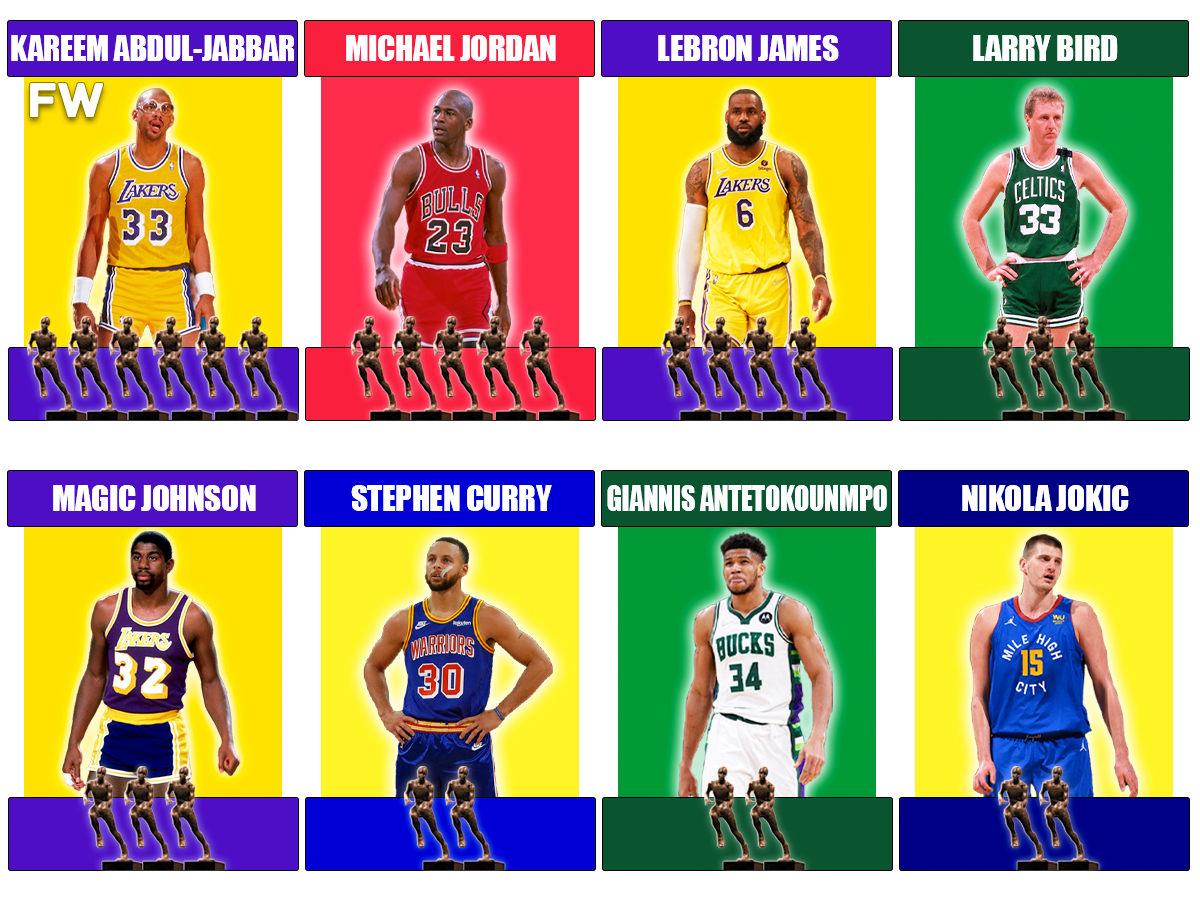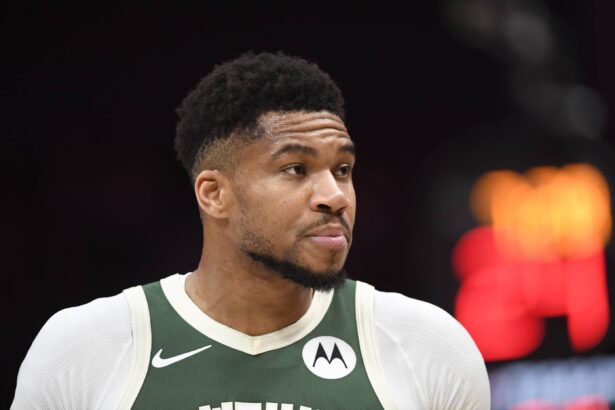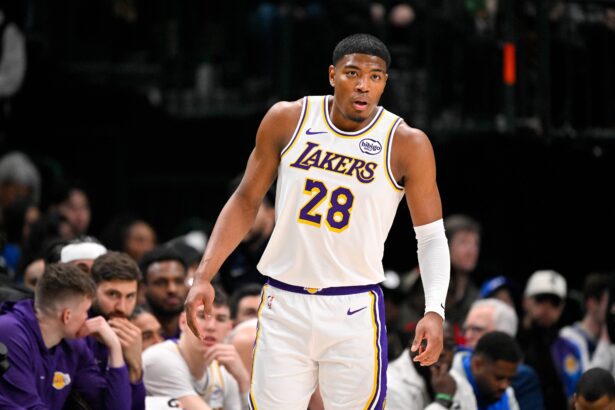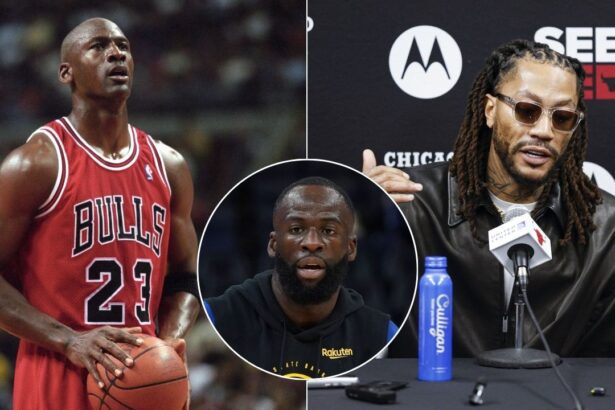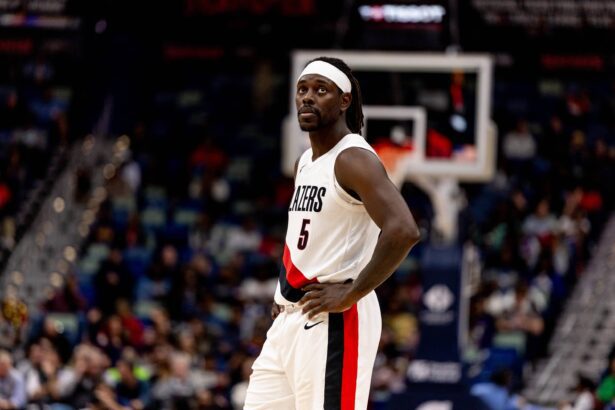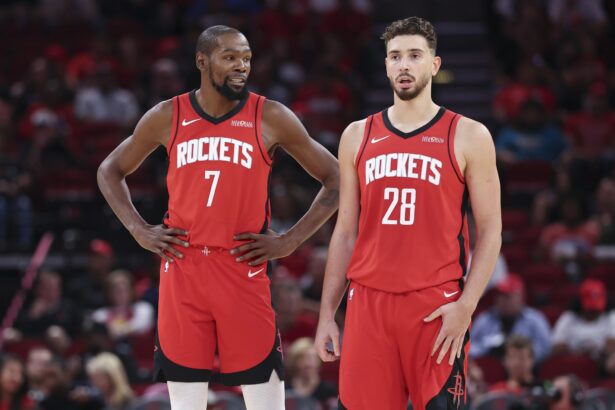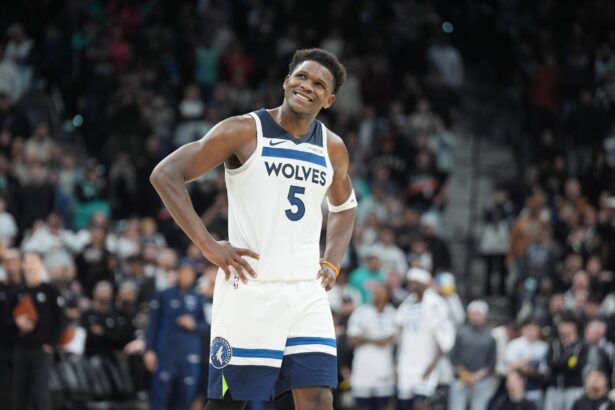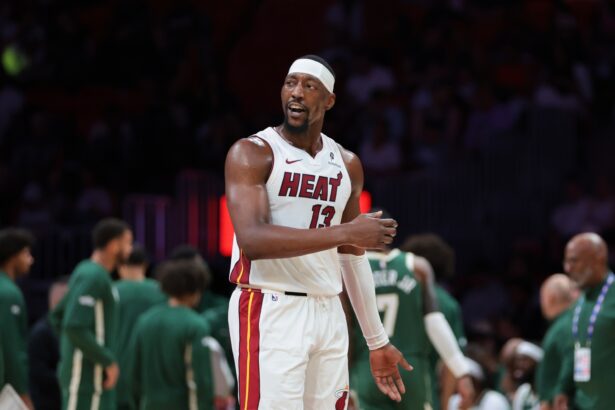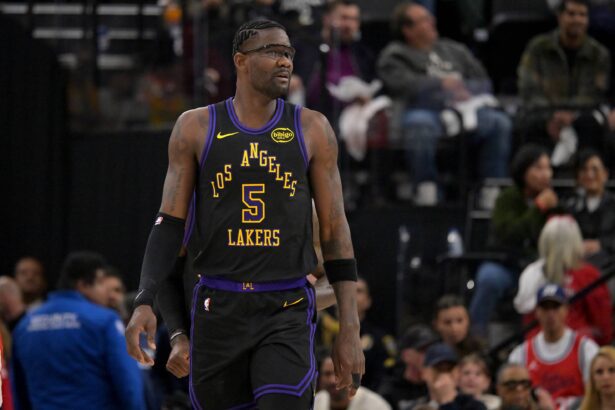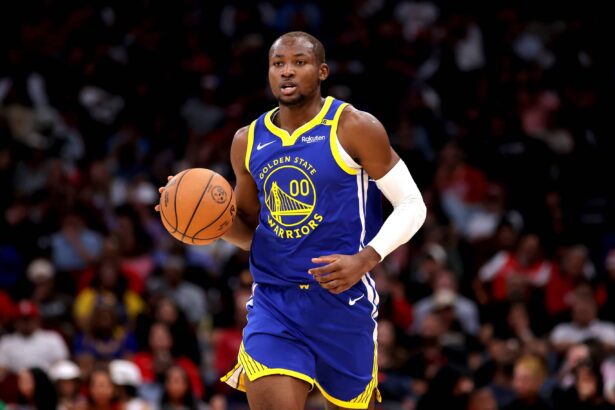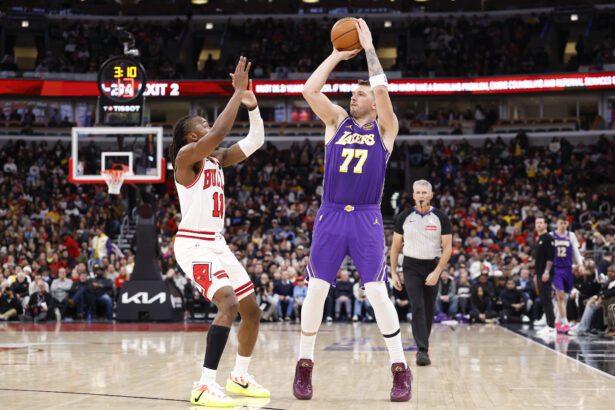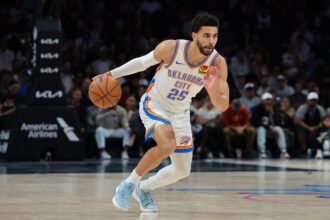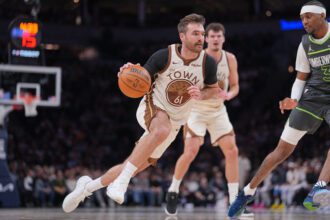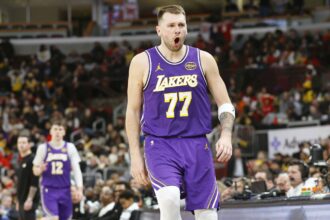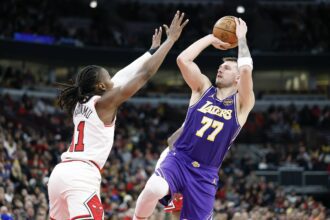Since 1956, the Most Valuable Player Award has been awarded to the best individual player for that specific season. Whether it be for his incredible all-around statistics or the fact he has played on a team that saw a lot of success, the MVP is usually given to the most impactful player in basketball. With him, his team is a contender, and without him, his team is a disaster. At the end of the regular season, the MVP stands alone above the rest as the most important and best all-around player in the game.
- Players With One MVP Award
- Bob Pettit – 2 MVP Awards
- Karl Malone – 2 MVP Awards
- Tim Duncan – 2 MVP Awards
- Steve Nash – 2 MVP Awards
- Stephen Curry – 2 MVP Awards
- Giannis Antetokounmpo – 2 MVP Awards
- Nikola Jokic – 2 MVP Awards
- Moses Malone – 3 MVP Awards
- Larry Bird – 3 MVP Awards
- Magic Johnson – 3 MVP Awards
- Wilt Chamberlain – 4 MVP Awards
- LeBron James – 4 MVP Awards
- Bill Russell – 5 MVP Awards
- Michael Jordan – 5 MVP Awards
- Kareem Abdul-Jabbar – 6 MVP Awards
- Next
- 10 Youngest NBA Players To Win The MVP Award: Derrick Rose Was Only 22 Years Old When He Broke This Record
- The Only NBA Players Who Won 3 NBA Championships, 3 MVP Awards, And 3 Finals MVP Awards
- The Only No. 1 Overall NBA Draft Picks Who Won The MVP Award: Kareem Abdul-Jabbar Is First With 6, LeBron James Is Second On The List With 4
- 15 Best NBA Players Who Spent Their Entire Career With One Team
- The All-Time Greatest International Team: Starting Lineup, Bench, And Coach
The MVP award has been given out since the end of the 1955-56 season. Of the total 67 MVP awards given out, 20 players have won it a total of one time, while 15 players have taken it home more than once. The players that have done it just once still had some of the best individual seasons in NBA history. For the players that have won it more than one time, it shows an incredible consistency of greatness. If you have won just one MVP award in your career, you are still considered among the most elite to ever play the game. The players that have gone on to win it more than once are considered to be some of the greatest to ever live.
These are the players in NBA history that have won the most MVP awards.
Players With One MVP Award
Bob Cousy (1957), Oscar Robertson (1964), Wes Unseld (1969), Willis Reed (1970), Dave Cowens (1973), Bob McAdoo (1975), Bill Walton (1978), Julius Erving (1981), Charles Barkley (1993), Hakeem Olajuwon (1994), David Robinson (1995), Shaquille O’Neal (2000), Allen Iverson (2001), Kevin Garnett (2004), Dirk Nowitzki (2007), Kobe Bryant (2008), Derrick Rose (2011), Kevin Durant (2014), Russell Westbrook (2017), James Harden (2018)
As you can see, there has been an immense amount of talent to take home the MVP award throughout NBA history. The list of one-time MVP award winners is filled with players who made significant contributions to their team and to NBA history. You would be hard-pressed to argue that any of these 20 players didn’t deserve the award in the year in which it was awarded.
Not only did these 20 players take home an MVP award, but 9 of them have also taken home Finals MVP awards as well. Only 5 of the players before you have not gone on to win an NBA championship. Among the multiple-time MVP award winners, only 3 have never done so either. You cannot tell the story of NBA history without any of these 20 players above. As great as these one-time winners are, now we must dive into the multiple-time winners who rose to the top of the NBA on more than one occasion.
Bob Pettit – 2 MVP Awards
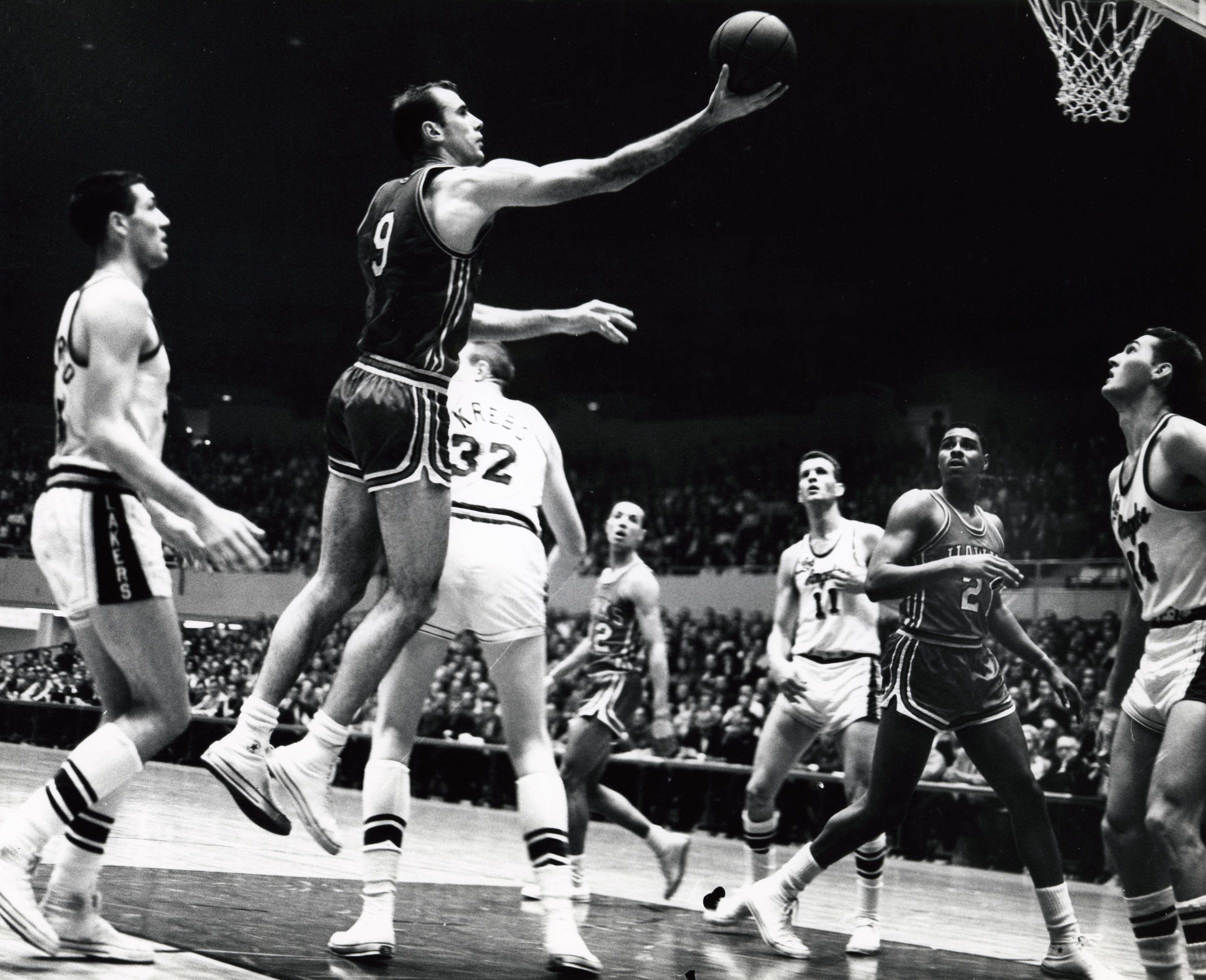
MVP Awards: 1956, 1959
Bob Pettit is one of the most decorated power forwards in NBA history. He was named an All-Star in every season of his career, as well as an All-NBA Team selection. Pettit won the inaugural MVP award in the 1955-56 season. That year, he led the NBA in scoring at 25.7 PPG while grabbing 16.2 RPG. He shot 42.9% from the field while turning the Hawks into legitimate contenders for an NBA championship.
The 2nd time Pettit won the award, he was coming off of an NBA championship in 1958. In the 1958-59 season, Pettit averaged 29.2 PPG, which once again led the NBA in scoring. He also grabbed 16.4 RPG and shot the ball at 43.8% from the field. The Hawks would not repeat as champions that year, but they wouldn’t have even been contenders if it weren’t for Pettit and the all-around game he brought to the team. Pettit spent 11 seasons in the NBA, winning 1 championship, 2 MVP awards, and 4 All-Star Game MVP awards.
Karl Malone – 2 MVP Awards
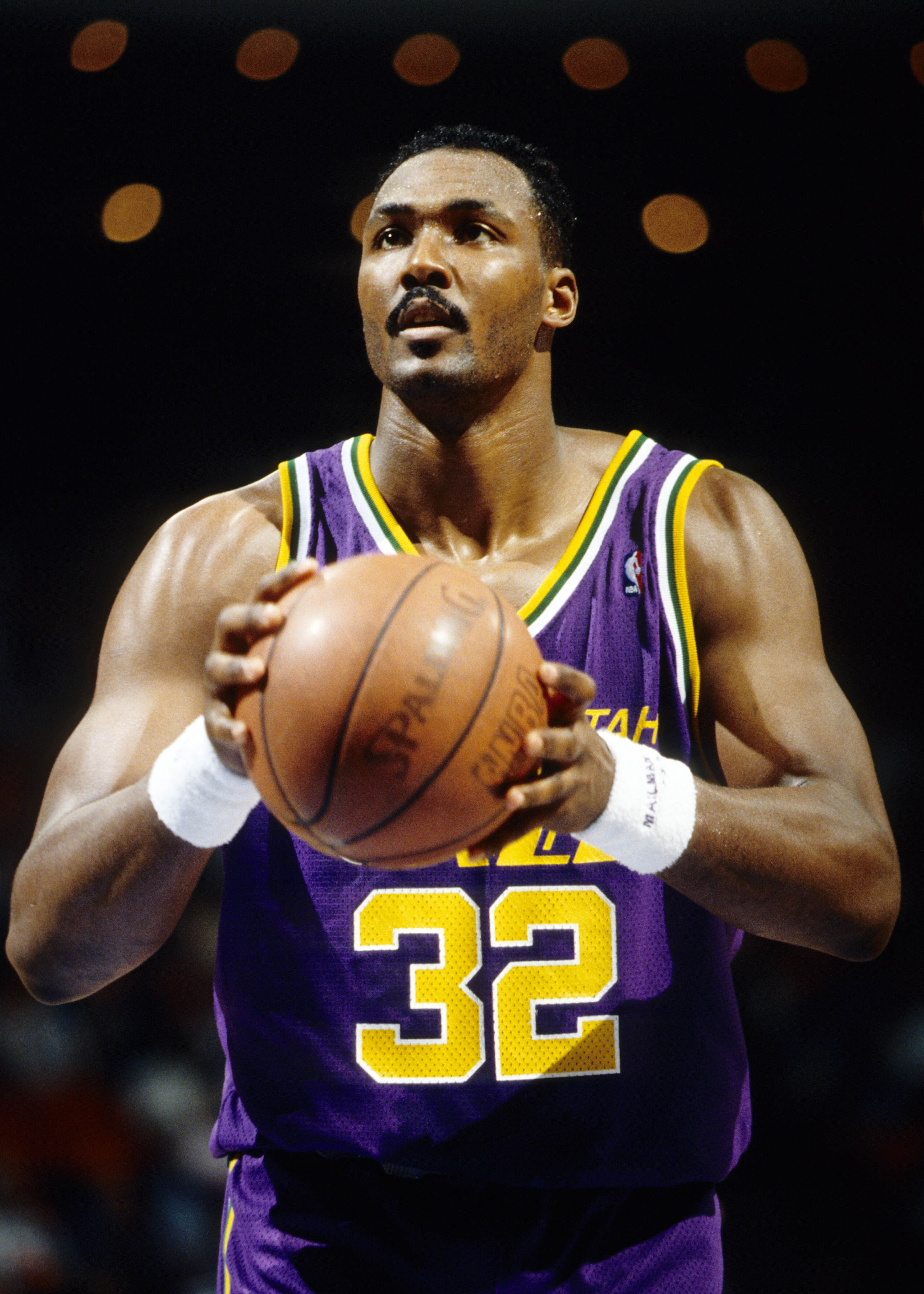
MVP Awards: 1997, 1999
During the 1990s, Karl Malone was one of the most overpowering forces in the entire NBA. Had it not been for a man named Michael Jordan, we may be looking at Malone as one of the greatest to ever play. The 1997 MVP award had some drama attached to it. Jordan thought that he deserved the award, as he would later show to the world during that year’s NBA Finals. Malone averaged 27.4 PPG, 9.9 RPG, and 1.4 SPG to claim the award in 1997 while leading the Utah Jazz to 64 wins. He would lead them to the Finals as well, where MJ “took it personally” and dismissed Utah in 6 games.
With Jordan retired in the 1998-99 season, Malone had free rein to claim his 2nd MVP award. He averaged 23.8 PPG, 9.4 RPG, 4.1 APG, and 1.3 SPG to win the award. Scoring was never an issue for Malone as he tallied the 2nd most points in NBA history by the time he retired and stands 3rd all-time as of right now. In 1999, Malone led the Jazz to 37 wins in the lockout-shortened season. That season, the Jazz were upset by the Portland Trail Blazers in the 2nd round of the playoffs. Malone may have never reached the pinnacle of team success, but he sure did individually.
Tim Duncan – 2 MVP Awards
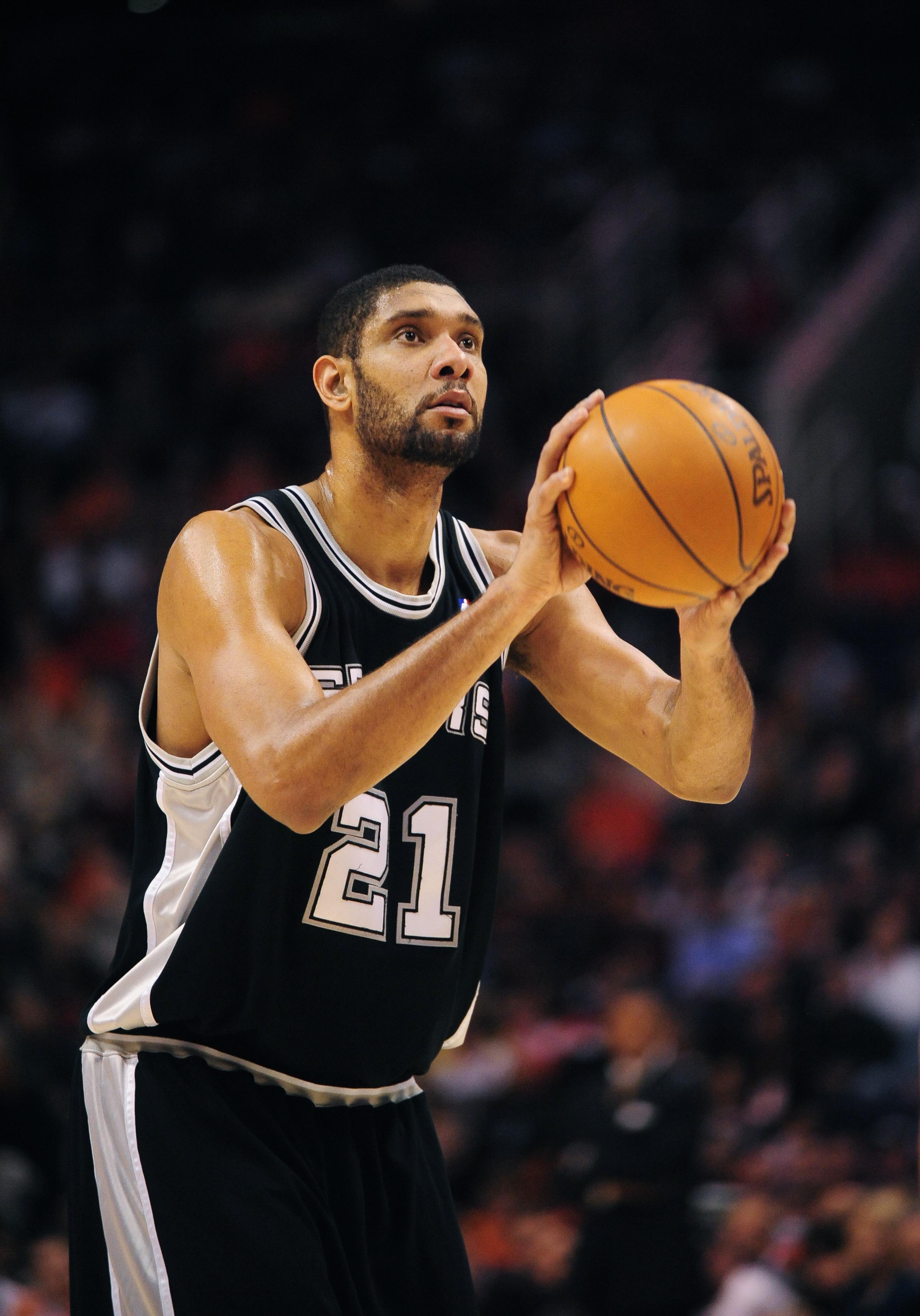
MVP Awards: 2002, 2003
By the time Tim Duncan won his first MVP award in 2002, we already knew how special of a player he was. Criticized for his “boring” style of play, Duncan let the haters talk their talk while he racked up individual accolades and championships. In 2002, Duncan averaged 25.5 PPG and 12.7 RPG to go along with his elite interior defense at 2.5 BPG. The Spurs would win 58 games that season and lose to the Lakers in the 2nd round of the playoffs.
The following season was more of the same from Duncan. He averaged 23.3 PPG and 12.9 RPG to go with 2.9 BPG. It was the 6th season in a row that Duncan recorded at least 2.2 BPG. With his elite interior defense and ability to rebound and score at a high level, Duncan claimed the MVP for the 2nd year in a row. The Spurs would win 60 games and go on to win the NBA championship in 6 games over the New Jersey Nets. Duncan would claim Finals MVP with 24.2 PPG, 17.0 RPG, and 5.3 BPG in the series.
Steve Nash – 2 MVP Awards

MVP Awards: 2005, 2006
I don’t think any MVP winner in the past 30 years gets more discredit for his awards than Steve Nash in 2005 and 2006. Nash was the head of the most high-powered and potent offense that we had seen in years with the Phoenix Suns under Coach Mike D’Antoni. Nash’s MVPs came in his first 2 seasons with the Suns, winning 54 games or better each season. In 2005, Nash averaged 15.5 PPG and led the league in assists with 11.5 APG. He led the Suns to 54 wins and a division title.
The 2006 MVP award win for Nash was even a bit more controversial. Many thought that the Lakers’ Kobe Bryant deserved to win the award but nevertheless, Nash took it home for the 2nd year in a row. Nash averaged 18.8 PPG and led the league in assists once again with 10.5 APG. During this run, Nash joined the elite 50/40/90 club, making him one of the most efficient MVP winners in NBA history. The Suns won 62 games in the process but were ultimately eliminated by the Mavericks in the Western Conference Finals.
Stephen Curry – 2 MVP Awards
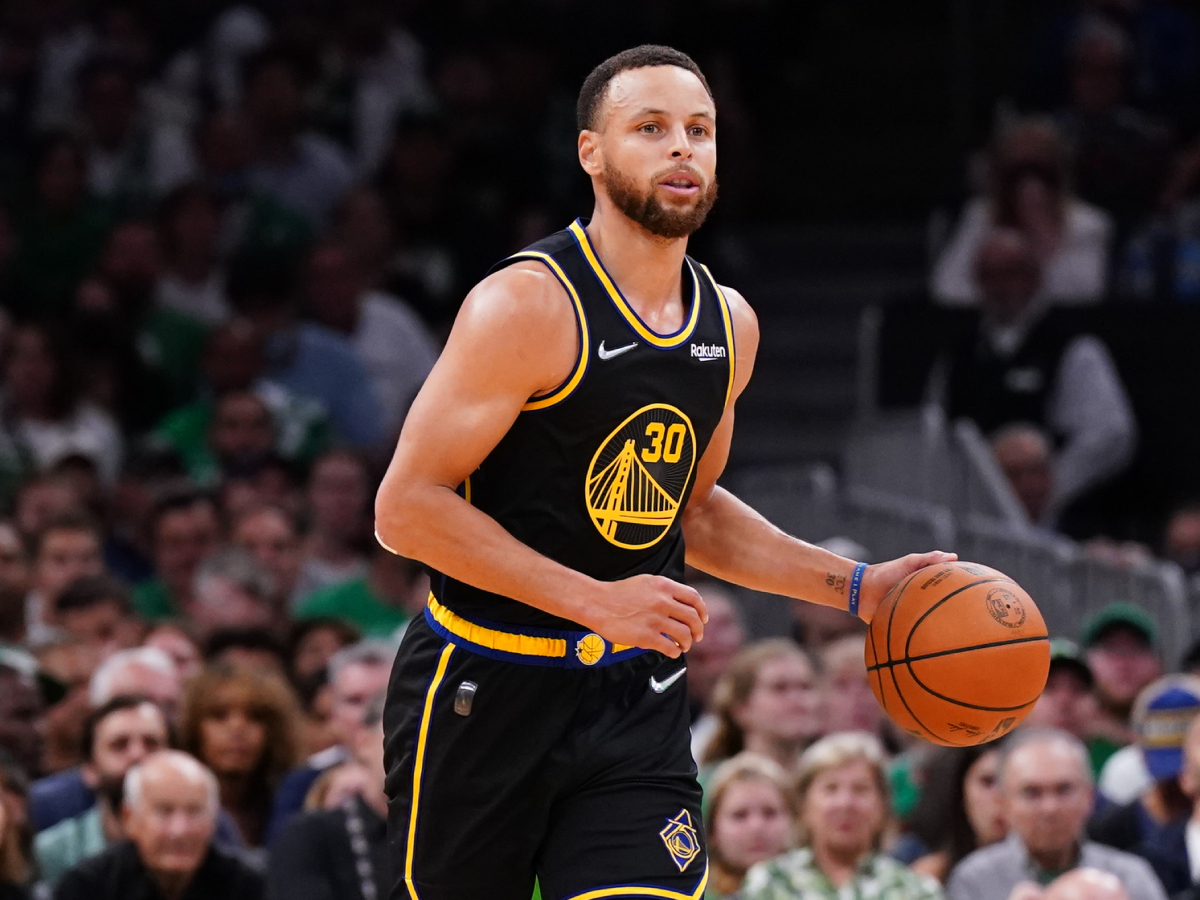
MVP Awards: 2015, 2016
It is no secret that Stephen Curry has cemented his legacy as the greatest shooter of all time. Nothing was more indicative of what was to come than his 2 MVP seasons in 2015 and 2016. Curry had only become an All-Star in 2014 before transcending the game before our very eyes in 2015. That season, he averaged 23.8 PPG, 4.3 RPG, 7.7 APG, and 2.0 SPG. What made his season so special was the high volume of shots he was putting up from deep at high efficiency. He shot 44.3% from three on 8.1 attempts per game and led the league in free throw percentage at 91.4%. Curry would lead the Warriors to 67 wins that season and his 1st NBA championship.
The 2015 season was absolutely magical for Stephen Curry, but the 2016 season was downright insanity. Curry upped his volume from the previous season to 11.4 three-point attempts per game and shot the ball better at 45.4%. It wasn’t just the numbers, it was how he did it, seemingly always coming through in the clutch and going on shooting streaks that made all-time greats scratch their heads. He led the league in scoring at 30.1 PPG and steals with 2.1 SPG. He became the first and only unanimous MVP winner in NBA history while leading the Warriors to an NBA record of 73 wins.
Giannis Antetokounmpo – 2 MVP Awards
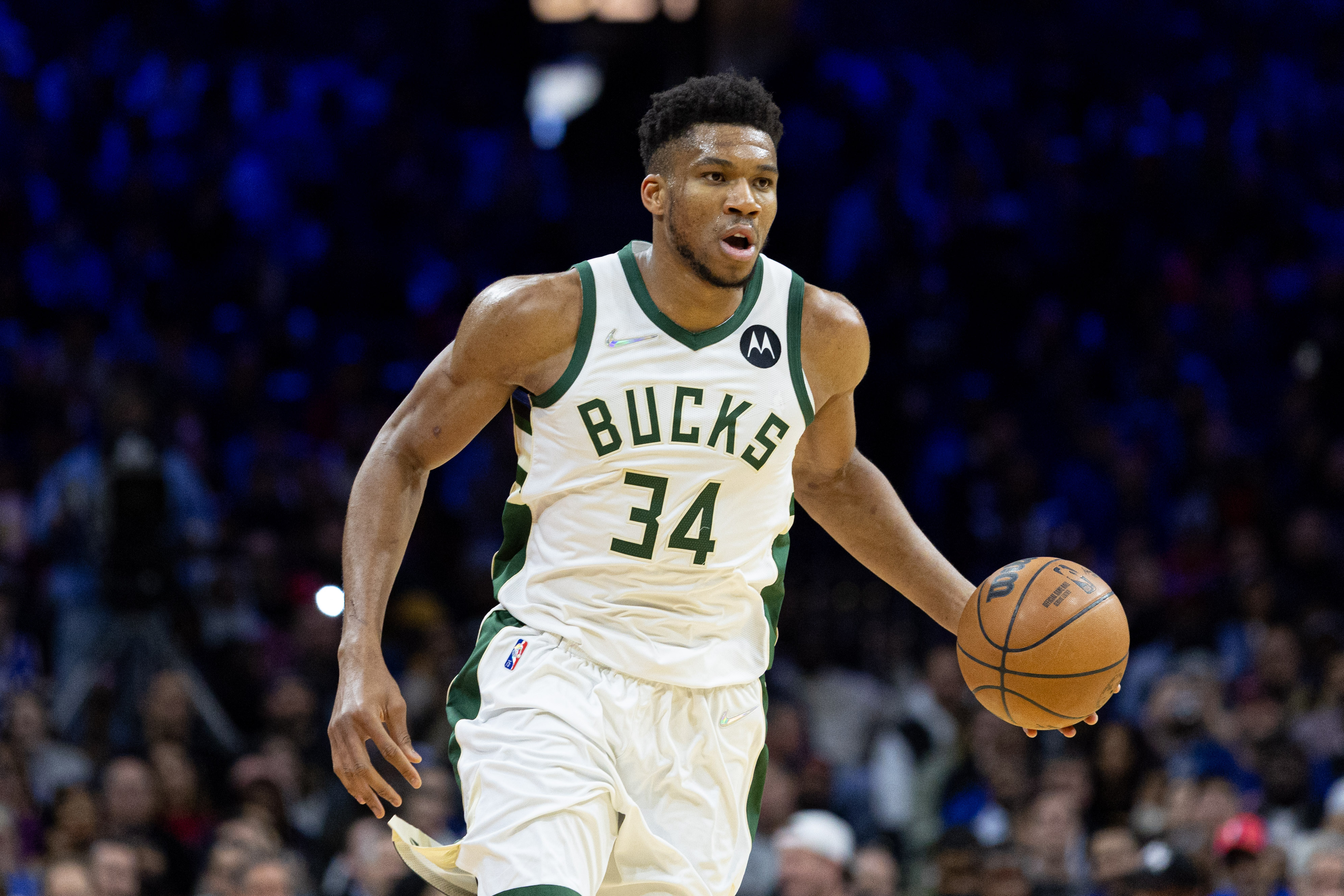
MVP Awards: 2020, 2021
As we head into the 2022-23 season, Giannis Antetokounmpo is the consensus best player in the world. Giannis began his ascent to the top back in the 2020 Covid-shortened season. His two-way abilities were on full display as he averaged 29.5 PPG, 13.6 RPG, 5.6 APG, 1.0 SPG, and 1.0 BPG. He would also take home the Defensive Player of the Year award in 2020. The Bucks won 56 games that season and owned the best record in the Eastern Conference. Antetokounmpo had arrived and put the league on notice that he was ready to be crowned the world’s No. 1 player.
Giannis followed up his incredible 2020 season with an even more spectacular 2021 season. Along with the MVP, he would claim the All-Star Game MVP award and eventually, the Finals MVP award as well. In 2021, he averaged 28.1 PPG, 11.0 RPG, 5.9 APG, 1.2 SPG, and 1.2 BPG. Arguably, his numbers had dipped, but he was an even better player than the previous season. After claiming his 2nd MVP award in as many seasons, Giannis would lead the Bucks to their first championship in 50 years and claim Finals MVP to top off an amazing run.
Nikola Jokic – 2 MVP Awards
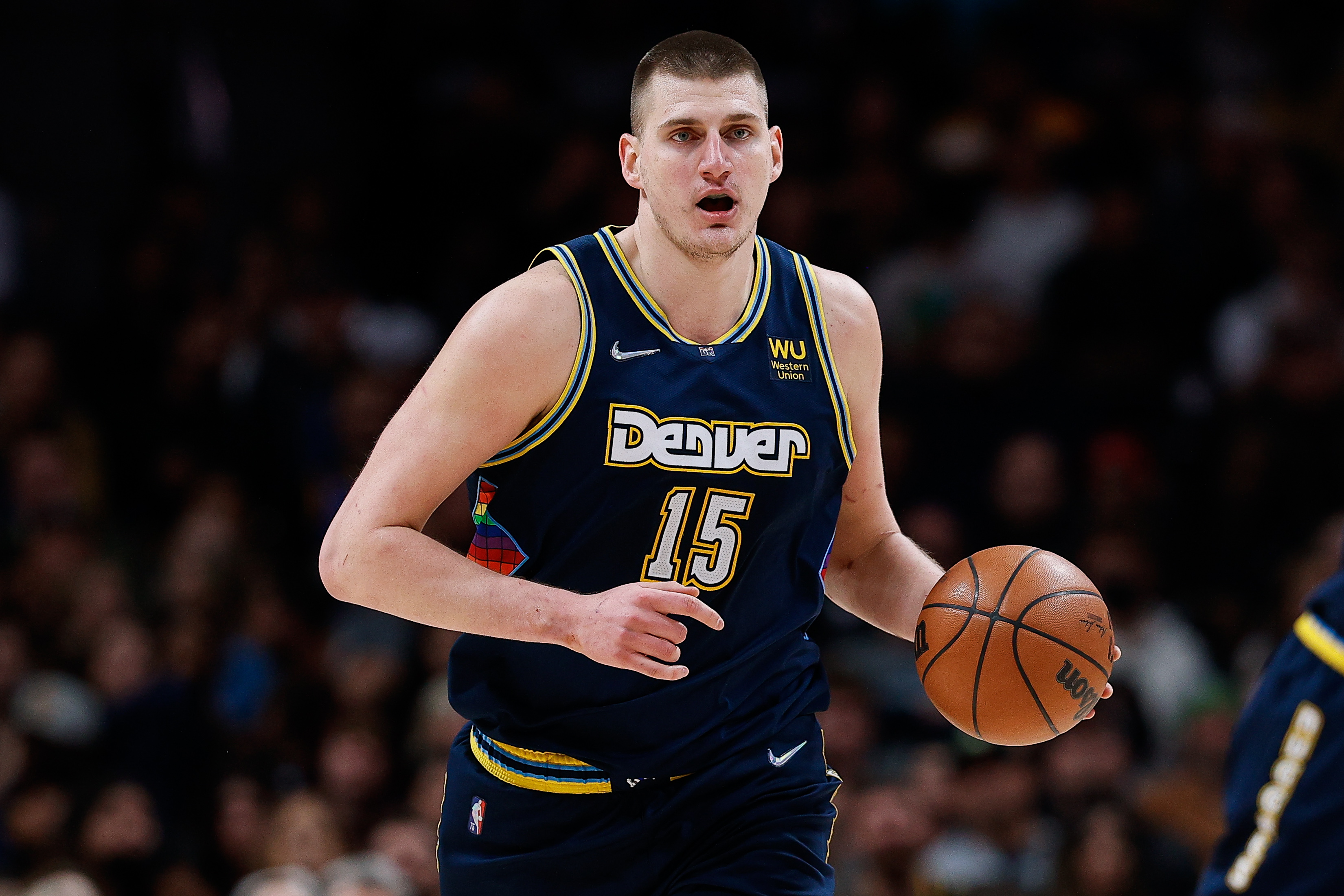
MVP Awards: 2021, 2022
Over the past 2 seasons, Nikola Jokic has established himself as one of the best players in the game. He has tapped into every facet of the game of basketball and excelled at them. He has become an elite passer, playmaker, scorer, and rebounder, all while leading the Nuggets to playoff berths when they most likely wouldn’t have earned them otherwise. In 2021, the Nuggets lost starting point guard Jamal Murray 48 games into the season. Jokic responded by averaging 26.4 PPG, 10.8 RPG, 8.3 APG, and 1.3 SPG. He led the Nuggets to 47 wins and a playoff berth en route to his first MVP win.
Things were no different in 2022. Jamal Murray missed the entire season with his ACL injury and Michael Porter Jr. was shut down after just 9 games. When things looked bleak for Denver, in stepped their MVP. In 2022, Jokic averaged 27.1 PPG, 13.8 RPG, 7.9 APG, and 1.5 SPG. Somehow the Nuggets finished 1 game better than the previous season and again made the playoffs on Jokic’s back. If there has ever been a true meaning of the word value in terms of the MVP award, Jokic has encapsulated it over the past 2 years.
Moses Malone – 3 MVP Awards
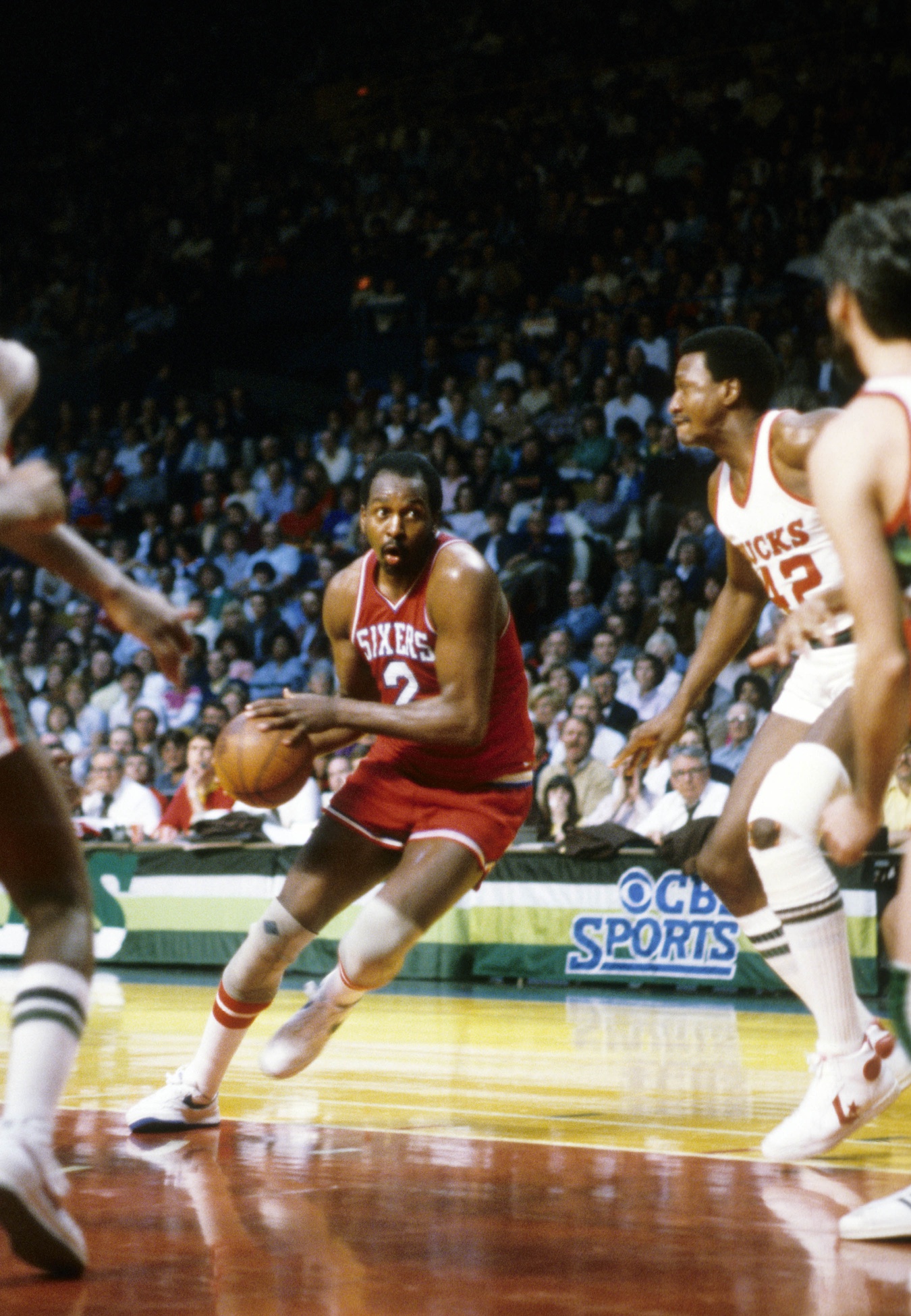
MVP Awards: 1979, 1982, 1983
Moses Malone is simultaneously one of the greatest and underrated players of all time. His 3 MVP wins are unique in the sense that they came when he was a member of 2 different teams. He won his 1st two MVPs as a member of the Houston Rockets in 1979 and 1982. Malone led the league in rebounding with 17.6 RPG and in minutes played in 1979, adding 24.8 PPG and 1.5 BPG to round it out. Houston made the playoffs but Malone would log only 2 games played in the postseason due to injury.
He won again with the Rockets in 1982 when he averaged 31.1 PPG, led the league in rebounding again with 14.7 RPG, and added 1.0 SPG and 1.5 BPG as well. The Rockets then surprisingly traded Malone to the 76ers that off-season. Malone responded by having the most dominant season of his career, winning MVP once again. The dominance didn’t stop there as he helped Philadelphia bulldoze the competition in the playoffs for his 1st and only NBA championship. Malone was named Finals MVP to cap off one of the better single seasons in the past 50 years.
Larry Bird – 3 MVP Awards
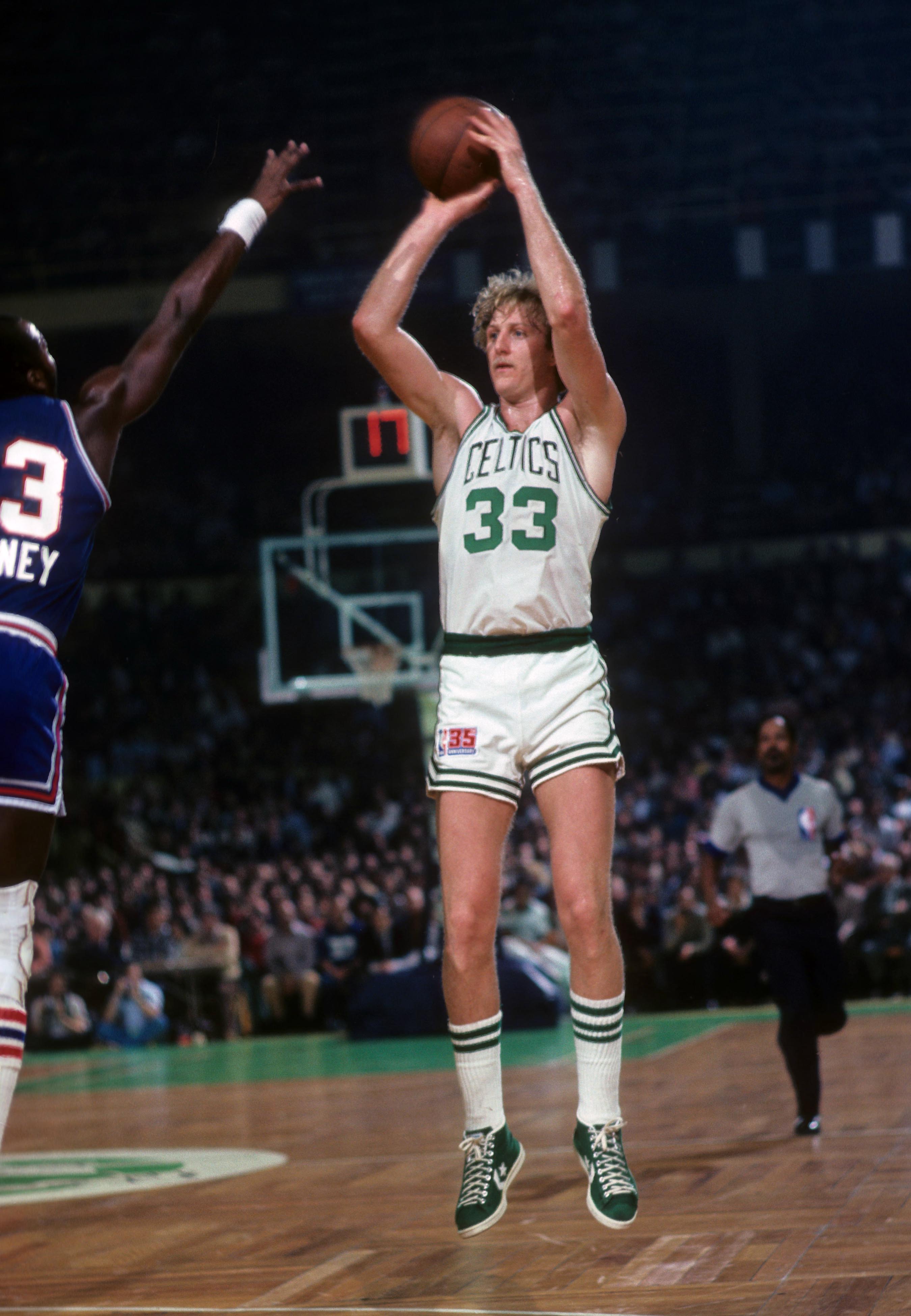
MVP Awards: 1984, 1985, 1986
Larry Bird’s three-peat as the NBA’s Most Valuable Player is one of the great 3-year stretches by any player on the planet. The first award came in 1984 when Bird averaged 24.2 PPG, 10.1 RPG, 6.6 APG, and 1.8 SPG. The Celtics went on to win 62 games that season and cruise their way to the NBA Finals. Boston would be victorious in the Finals series with Bird winning the Finals MVP award in the 7-game series win over the Lakers. In the Finals, Bird contributed 27.4 PPG and 14.0 RPG to secure the championship.
Bird would add 2 more MVP trophies to his mantle over the next 2 years. He won the award in 1985 when he averaged 28.7 PPG, 10.5 RPG, 6.6 APG, 1.5 SPG, and 1.2 BPG. He won it again in 1986 when he averaged 25.8 PPG, 9.8 RPG, 6.8 APG, and 2.0 SPG. The Celtics wouldn’t capture the NBA title in 1985, but they would in 1986 when they defeated the Houston Rockets in 6 games. Bird would again win Finals MVP with a masterful all-around performance of 24.0 PPG, 9.7 RPG, and 9.5 APG. Bird’s MVP season proved to be fruitful for all involved in the form of 3 Finals appearances and 2 championships.
Magic Johnson – 3 MVP Awards
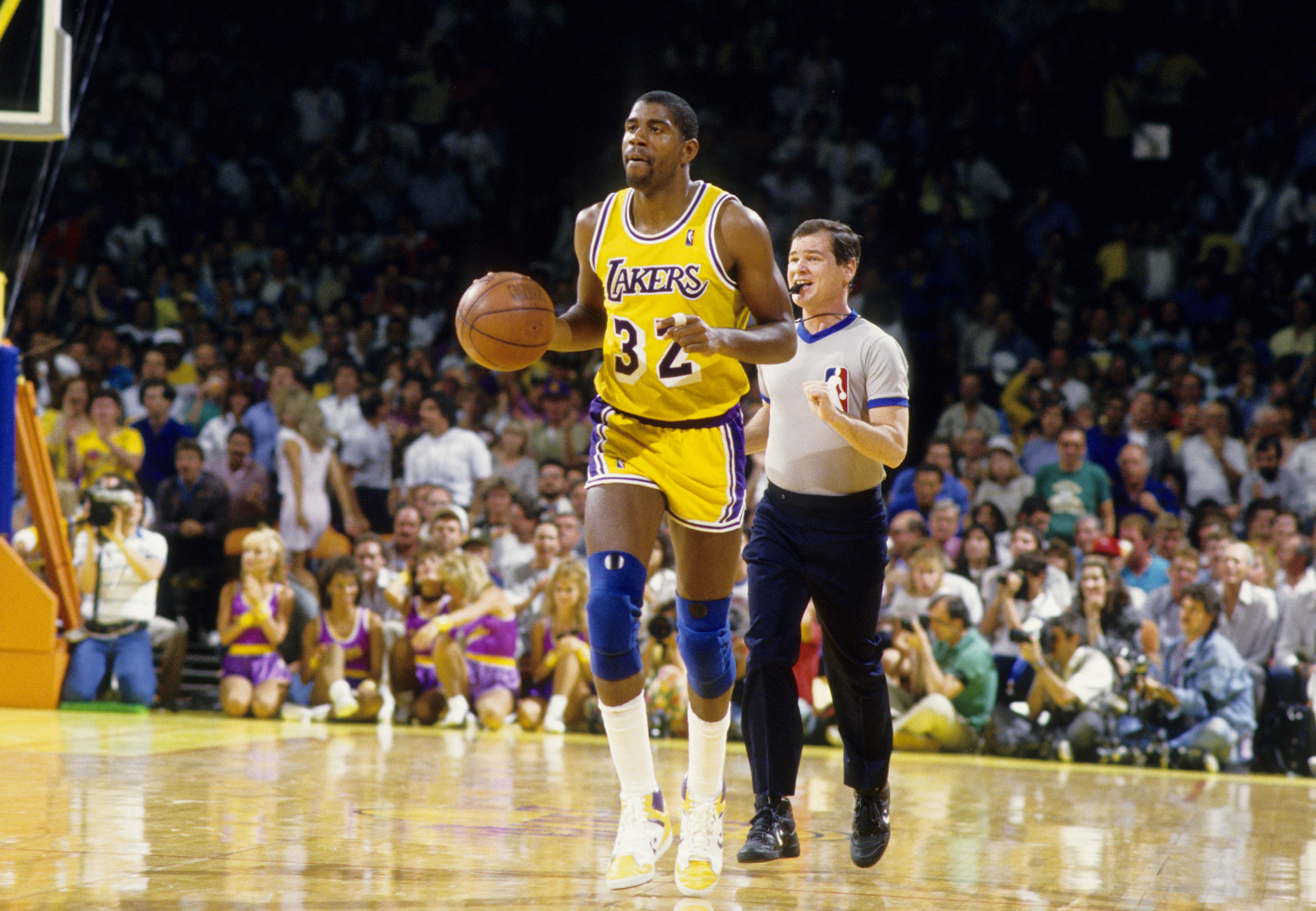
MVP Awards: 1987, 1989, 1990
As the greatest playmaker and overall point guard in league history, it is no surprise that Magic Johnson secured 3 MVP awards during his career. He notched all 3 awards in a 4-year span between 1987 and 1990. The first time he won the award was in 1987 when he led the Lakers to the NBA’s best record at 65-17. He averaged 23.9 PPG, led the league with 12.2 APG, and added 1.7 SPG. After being named MVP, Johnson led the Lakers to an NBA Finals victory over the Boston Celtics with Magic winning Finals MVP to add to his historic season.
The next two times he took home the MVP award were back-to-back in 1989 and 1990. Magic was on fire for the Los Angeles Lakers in these two seasons, filling up the stat sheet at a rapid rate over the span of 2 years. Between the 2 MVP seasons, he averaged 22.4 PPG, 7.2 RPG, 12.1 APG, and 1.7 SPG. The Lakers went a combined 120-44 over those 2 seasons but failed to bring home another championship. The MVP season from Magic in 1990 ended one of the best runs by a point guard in NBA history.
Wilt Chamberlain – 4 MVP Awards
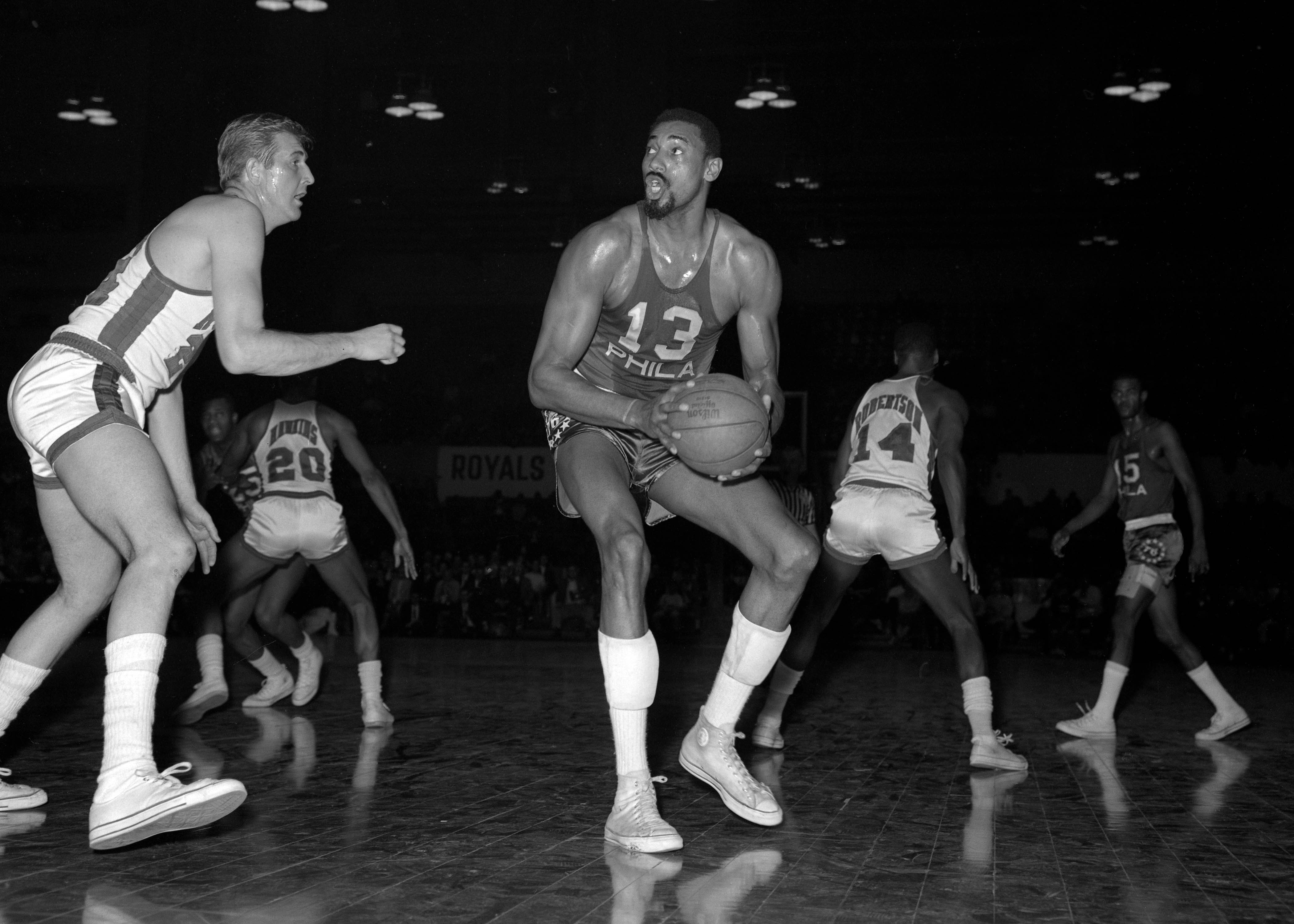
MVP Awards: 1960, 1966, 1967, 1968
The record of Wilt Chamberlain’s statistical dominance over the NBA is a long one and nothing else is more indicative of that than his 4 MVP-winning years. Chamberlain took home 4 MVPs in the 60s decade with 2 different teams that happened to be in the same city. He won the 1960 MVP with the Philadelphia Warriors when he averaged 37.6 PPG and 27.0 RPG. Oh yeah, he did this as a rookie and Philly won 49 games out of 75.
He then won 3 straight MVPs at the end of the decade, this time with an entirely new franchise, the Philadelphia 76ers. Over this 3-year stretch, Chamberlain averaged 27.3 PPG and 24.2 RPG. In the 1967 season, he took Philadelphia to the NBA Finals, where they emerged victorious for the second time in franchise history for the title of NBA champions. At this time, the players voted for the MVP award, which shows the level of respect Chamberlain had garnered from his peers over the years.
LeBron James – 4 MVP Awards
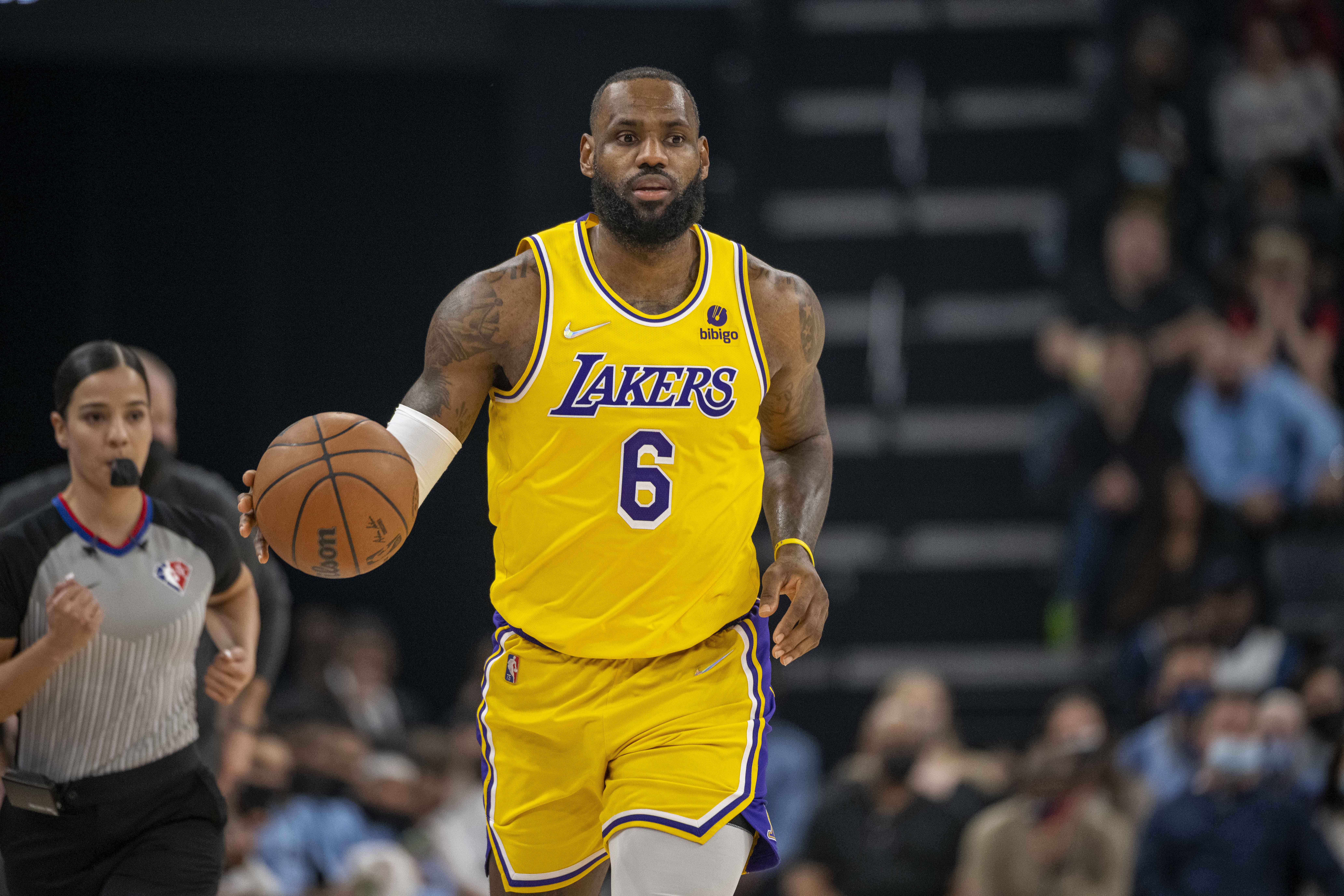
MVP Awards: 2009, 2010, 2012, 2013
Over the past 20 years, we have watched LeBron James be met with absurd expectations and not only meet them but smash them. His 4 MVP seasons were no different. He won all 4 MVPs in a 5-year span that saw him win 2 with the Cleveland Cavaliers and 2 with the Miami Heat. His first 2 MVP seasons came before he ever tasted championship glory in his first stint with the Cavaliers. Over those 2 years, he averaged 29.1 PPG, 7.4 RPG, 7.9 APG, 1.7 SPG, and 1.1 BPG and led the Cavs to a 127-37 record.
When LeBron left Cleveland to take his talents to South Beach, it caused an uproar that could be heard throughout the nation. It turned out to be the best basketball decision he ever made. The 2012 and 2013 version of LeBron James has an argument to be the best version of him we have ever seen. He was at his offensive and defensive peak as a player, and it showed every night he stepped out onto the court. Over these 2 years, James delivered the 2 MVPs, 2 championships, and 2 Finals MVPs to the city of Miami.
Bill Russell – 5 MVP Awards
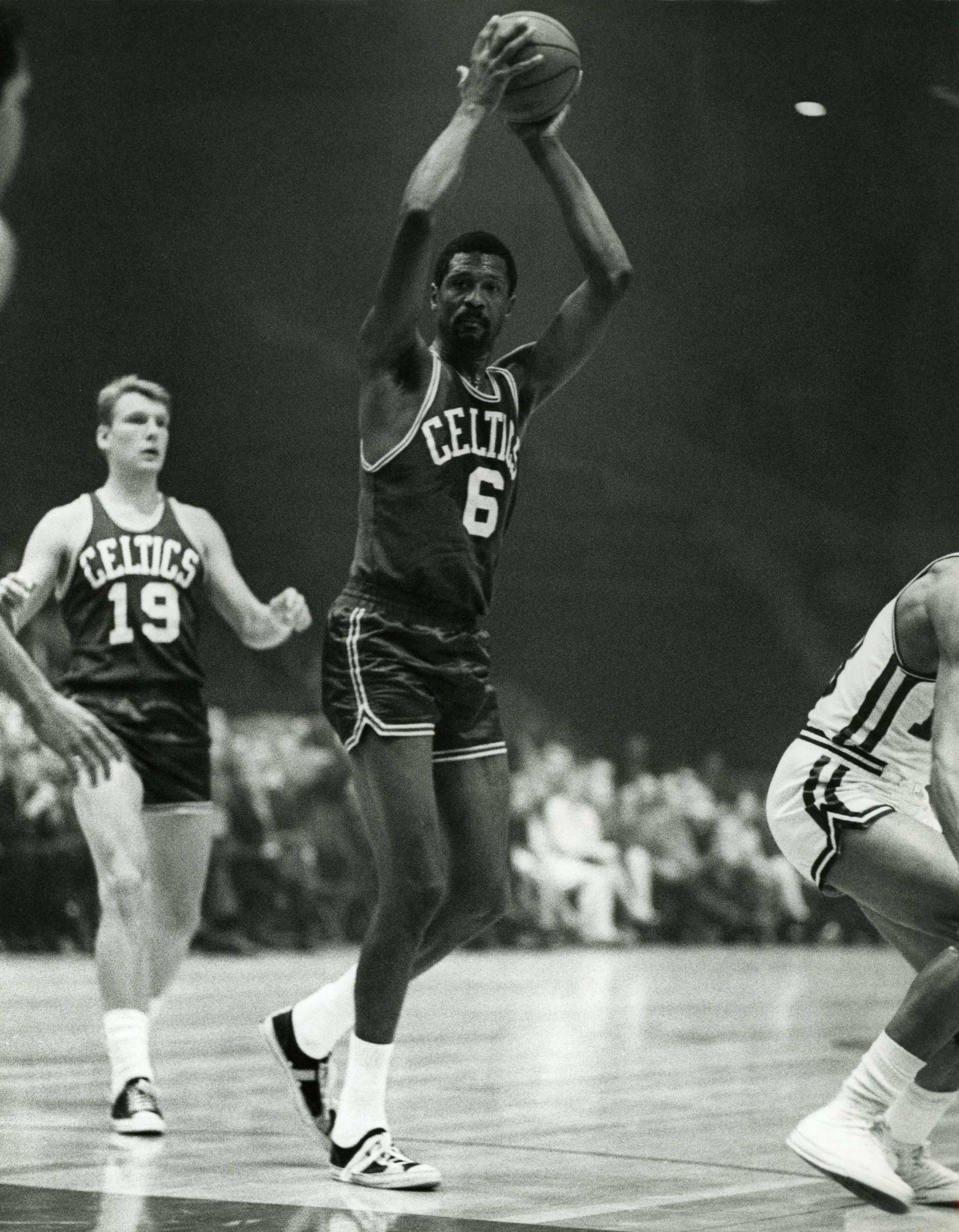
MVP Awards: 1958, 1961, 1962, 1963, 1965
Bill Russell is widely regarded as one of the best defenders and rebounders in NBA history. It was those skills combined with his oozing leadership that led to 5 MVP wins and 11 NBA championships. Russell won his first MVP award in just his 2nd season in the NBA in 1958. That season he averaged 16.6 PPG and 22.7 RPG, claiming 1 of his career 5 rebounding titles. The defensive impact was not measured by stats, but if you watched or have studied, then you’d understand why he was chosen as the MVP. Coincidentally, 1958 was 1 of only 2 seasons in Russell’s career that he did not lead the Celtics to a title.
Russell would add 4 more MVP trophies by the time the 60s were through. He won three straight MVPs from 1961 to 1963 and won 3 championships as well. Over those 3 years, Russell averaged 17.5 PPG and 23.7 RPG again, with no true way to measure his defensive impact. He would add another MVP in 1965 when he averaged 14.1 PPG and led the league with 24.1 RPG. In 3 of his 5 MVP seasons, Russell led the Celtics to NBA championships.
Michael Jordan – 5 MVP Awards
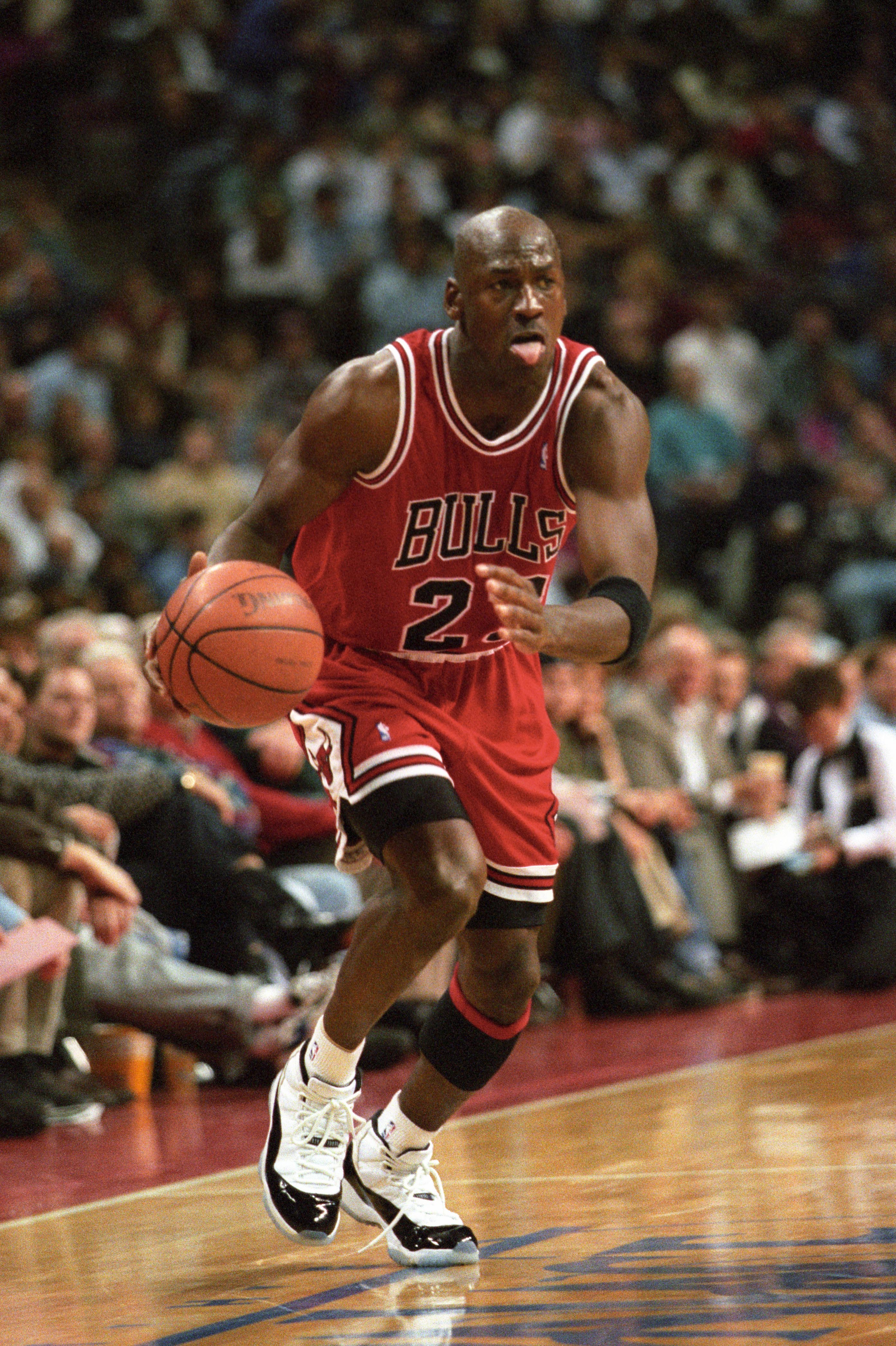
MVP Awards: 1988, 1991, 1992, 1996, 1998
Michael Jordan is another one of those players whose statistical dominance is well documented. In 4 out of the 5 seasons that Jordan was voted MVP, his Chicago Bulls went on to win championships with him at the helm. The lone titleless MVP came in 1988 when Jordan was in his 4th season. Jordan dominated the league with his second scoring title at 35.0 PPG, added 5.5 RPG and 5.9 APG, and led the league in steals with 3.2 SPG. He was also named Defensive Player of the Year that season.
The next 2 MVP wins for Jordan came back-to-back in the 1991 and 1992 seasons. It was yet another scorching scratch for the GOAT as he averaged 31.3 PPG, 6.5 RPG, 5.8 APG, and 2.6 SPG over those 2 seasons. During this time, Jordan won 2 scoring titles, 2 championships, 2 MVPs, 2 Finals MVPs, and led the league in steals once. He would win 2 more MVPs in 1996 and 1998. The wins toward the tail end of the 90s also came in seasons in which he led the Bulls to 2 more championships while claiming 2 more Finals MVP awards.
Kareem Abdul-Jabbar – 6 MVP Awards
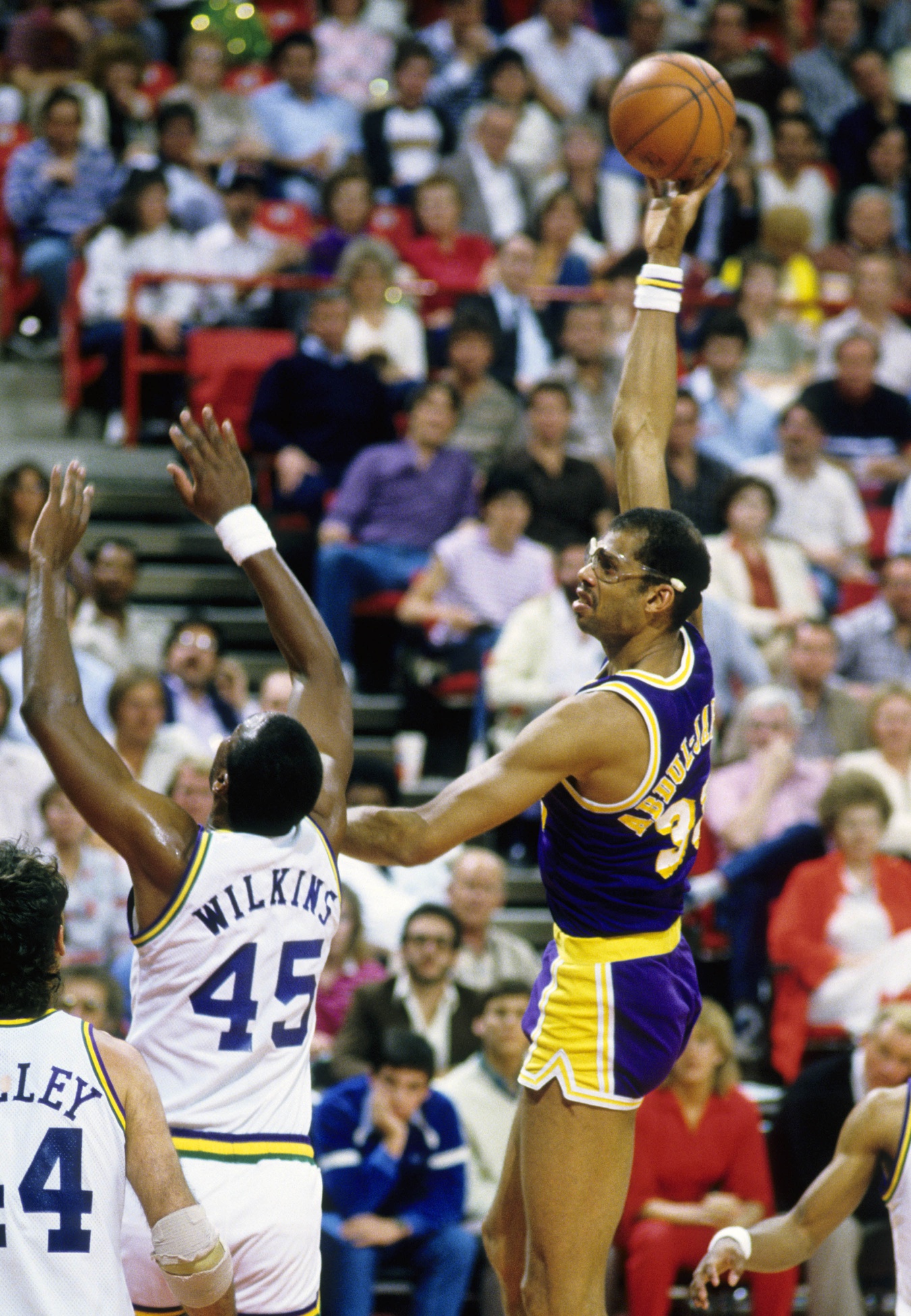
MVP Awards: 1971, 1972, 1974, 1976, 1977, 1980
Most who watched him play will tell you that Kareem Abdul-Jabbar has an argument for the title of the greatest player to ever live. His numbers and his impact on each franchise that he played for can back that up. Kareem won 6 total MVP awards in his career and they all occurred within a 10-year span. Kareem went back-to-back with MVPs with the Milwaukee Bucks in 1971 and 1972, winning a championship for Milwaukee in 1971 as well. He would add another MVP with the Bucks in 1974 before leaving for the Lakers in 1975.
Kareem arrived in Los Angeles and immediately picked up where he left off for Milwaukee. He won 2 MVPs in his first 2 seasons with the Lakers but couldn’t get them to where they wanted to go in the playoffs. Over those 2 years, Kareem averaged 27.0 PPG, 15.1 RPG, and 3.7 BPG. The 1979-80 season was a different story. Kareem would win another MVP that season, with averages of 24.8 PPG, 10.8 RPG, and a league-leading 3.4 BPG. Thanks to the addition of one Magic Johnson, the Lakers were able to secure an NBA championship that season, capping off an incredible one from Kareem. With 6 total MVP awards, Kareem is the all-time leader in this accolade, adding to the long list of accomplishments for the legendary center.

